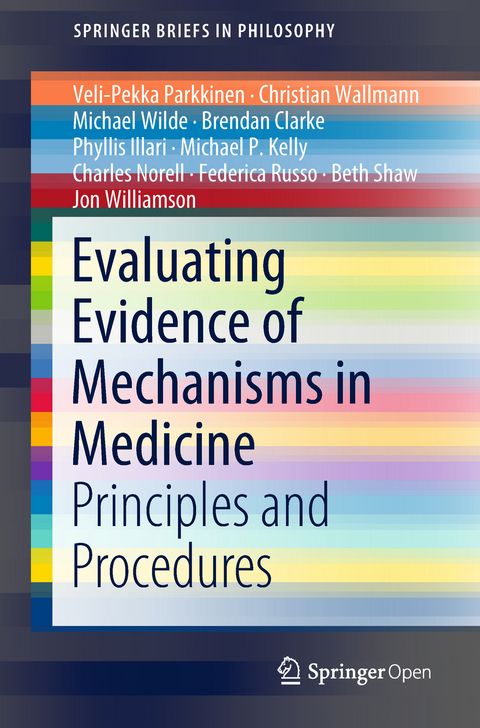
Evaluating Evidence of Mechanisms in Medicine
Springer International Publishing (Verlag)
978-3-319-94609-2 (ISBN)
This book is open access under a CC BY license.
This book is the first to develop explicit methods for evaluating evidence of mechanisms in the field of medicine. It explains why it can be important to make this evidence explicit, and describes how to take such evidence into account in the evidence appraisal process. In addition, it develops procedures for seeking evidence of mechanisms, for evaluating evidence of mechanisms, and for combining this evaluation with evidence of association in order to yield an overall assessment of effectiveness.
Evidence-based medicine seeks to achieve improved health outcomes by making evidence explicit and by developing explicit methods for evaluating it. To date, evidence-based medicine has largely focused on evidence of association produced by clinical studies. As such, it has tended to overlook evidence of pathophysiological mechanisms and evidence of the mechanisms of action of interventions.
The bookoffers a useful guide for all those whose work involves evaluating evidence in the health sciences, including those who need to determine the effectiveness of health interventions and those who need to ascertain the effects of environmental exposures.
The authors of this book are members of EBM+ (ebmplus.org), a network of researchers investigating the role of evidence of mechanisms in the health sciences. During the writing of this book, Parkkinen, Wallmann, Wilde and Williamson were based at the Centre for Reasoning, University of Kent; Clarke, Illari and Norell at the Department of Science and Technology Studies, UCL; Kelly at the Department of Public Health and Primary Care, University of Cambridge; Russo at the Department of Philosophy, University of Amsterdam; and Shaw at the National Institute of Health and Care Excellence, UK. This research way supported by the UK Arts and Humanities Research Council and the Leverhulme Trust.
1 Introduction.- 1.1 What is a mechanism?.- 1.2 Where does evidence of a mechanism come from?.- 1.3 Why consider evidence of mechanisms?.- 1.3.1 Evaluating efficacy.- 1.3.2 Evaluating external validity.- 1.3.3 Other questions.- 1.3.4 Importance of considering evidence of mechanisms.- 2 How to consider evidence of mechanisms: a summary.- 2.1 Questions to address.- 2.2 Quality level of evidence and status of claim.- 2.3 Identifying evidence of mechanisms in the literature.- 2.4 Evaluating evidence of mechanisms.- 2.5 Using evidence of mechanisms to evaluate causal claims.- 2.6 Overall approach.- 3 Identifying evidence of mechanisms in the literature.- 3.1 Hypothesize a mechanism.- 3.2 Search the literature.- 3.3 Identify the evidence most relevant to the mechanism hypothesis.- 3.4 Presenting the evidence of mechanisms.- 4 Evaluating evidence of mechanisms.- 4.1 Considerations for evaluating evidence of mechanism.- 4.2 Presenting quality of evidence of mechanisms.- 5 Using evidence of mechanisms to evaluate efficacy and external validity.- 5.1 Efficacy.- 5.2 External validity.- 6 Glossary.- 7 References.- 8 Acknowledgements.- 9 Appendix A. A critical appraisal tool for evidence of mechanisms.- 10 Appendix B. GRADE tables with mechanism assessment.- 11 Appendix C: Databases for evidence of mechanisms.- 12 Appendix D: Assessing exposures.- 12.1 Example: carcinogenicity of benzo[a]pyrene.- 12.2 Comparison to IARC.- 12.3 Molecular epidemiology.- 12.4 Comparison to SYRINA.
| Erscheinungsdatum | 15.07.2018 |
|---|---|
| Reihe/Serie | SpringerBriefs in Philosophy |
| Zusatzinfo | XVIII, 125 p. 14 illus. |
| Verlagsort | Cham |
| Sprache | englisch |
| Maße | 155 x 235 mm |
| Gewicht | 229 g |
| Themenwelt | Geisteswissenschaften ► Philosophie ► Erkenntnistheorie / Wissenschaftstheorie |
| Medizin / Pharmazie ► Medizinische Fachgebiete ► Medizinethik | |
| Schlagworte | analogous epistemic theory • Assessing exposures • ebmplus.org • effects of environmental exposures • Evaluating evidence • evidence and status of claim. • Evidence-based Medicine • Evidence-based medicine (EBM) • Evidence hierarchy • evidence of mechanisms • external validity • humanities research • Hypothesize a mechanism • Mechanism hypothesis • Mechanisms in literature • Mechanisms in medicine • Medical methodology • Molecular Epidemiology • open access • Philosophy of Medicine |
| ISBN-10 | 3-319-94609-9 / 3319946099 |
| ISBN-13 | 978-3-319-94609-2 / 9783319946092 |
| Zustand | Neuware |
| Haben Sie eine Frage zum Produkt? |
aus dem Bereich


![Was heißt Denken?. Vorlesung Wintersemester 1951/52. [Was bedeutet das alles?] - Martin Heidegger](/media/113619842)